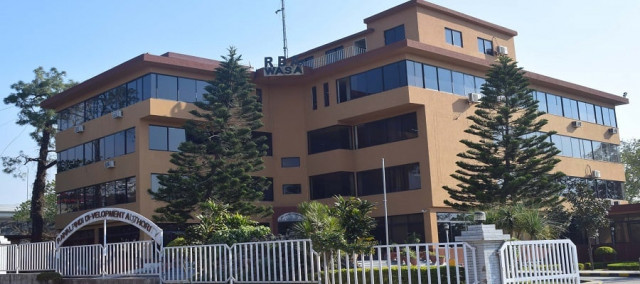Unplanned urbanisation: Rawalpindi spiralling out of control
Unregistered housing societies expanding into farmland as understaffed RDA looks on helplessly

Rawalpindi Development Authority. PHOTO: ONLINE
As a result, irregular constructions have popped up all over the city and there is a growing trend of building residential structures on agricultural lands in the outskirts without obtaining the requisite permissions.
According to a Rawalpindi Development Authority (RDA) notification issued in 1998, the authority controls both sides of the Adiala Road from Khawaja Corporation to Adiala Vilage, Dhamial Road from Kotha Village to Dhamial Village, Chakri Road from Lakhan Mor to Morah Chappar Village, and Girja Road from Girja Village to Noon Village on the border with Islamabad. Some areas on Fateh Jang Road also come under RDA.
A visit to these and other areas of the city revealed that the authority’s bylaws were being violated with impunity.
Under the laws, a major road should be around 30 feet wide, while streets should not be less than 25 feet wide. Both should allow sufficient space for sewerage lines on either side of the thoroughfare. Furthermore, the laws dictate that houses should not extend their ramps onto the streets, while all houses need to have proper
open spaces.

But there is hardly any locality in the city where these laws are being followed. Small streets and lanes with small houses continue to crop up here and there, as locals carve up land according to their own convenience, rather than following the bylaws.
Encroachments in some areas are so widespread that roads have become too narrow for cars or vans to pass through.
Furthermore, with the RDA failing to launch even a single housing project since its inception, illegal housing societies have sprung up across the city. None of them societies have bothered to follow the bylaws.
In recent years, illegal construction has spilled over farmland on the outskirts of the city, especially along Adiala and Chakri roads. Unregistered housing societies are buying large swaths of land from local farmers to develop residential and commercial buildings.
But without obtaining any permission from the RDA or by following the prescribed rules, these societies threaten to not only reduce the available agricultural land, but also raise concerns over the future of the environment in these areas, along with water supply, sanitation, sewerage, and transportation.
The RDA Building Enforcement Department is well aware of the issues around the city, but has not taken any action due to a lack of available staff, and ‘external pressures’, directly leading to a loss of revenue for the body and for the city administration.
No senior RDA official was ready to speak on the record. Rawalpindi Commissioner Azmat Mahmood could also spare no time to comment on the authority.
A senior RDA official, speaking on the condition of anonymity, said the civic agency was grossly understaffed and underfunded.
He said that the authority was sanctioned to have 16 building inspectors, but currently only has four. It was also supposed to have three assistant directors to ensure building bylaws are implemented, but has to make do
with just one.
The official added that the RDA was also supposed to have its own magistrate so that violators and encroachers could be punished, but the judicial office of the department is not even operational.
Furthermore, the official complained that RDA staff seldom gets the required support from local revenue officers or the police when demarcating land and enforcing bylaws.
As if the lack of police cover was not enough, the RDA official lamented that their staff would come under immense political pressure to open any buildings sealed for bylaw violations.
He added that the RDA was a revenue-generating body, but with limited staff and resources, it was restricted to revenue from core urban areas, which was only enough to fund the department’s overheads.
Published in The Express Tribune, December 1st, 2016.



















COMMENTS
Comments are moderated and generally will be posted if they are on-topic and not abusive.
For more information, please see our Comments FAQ